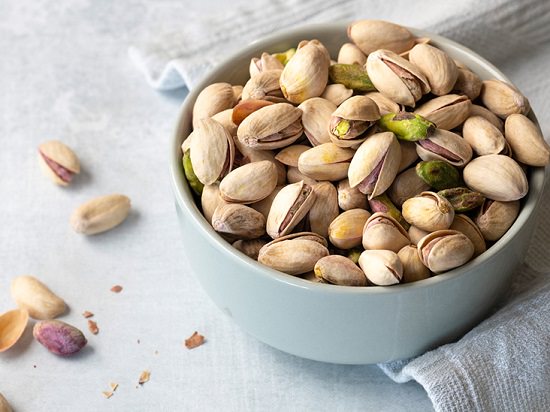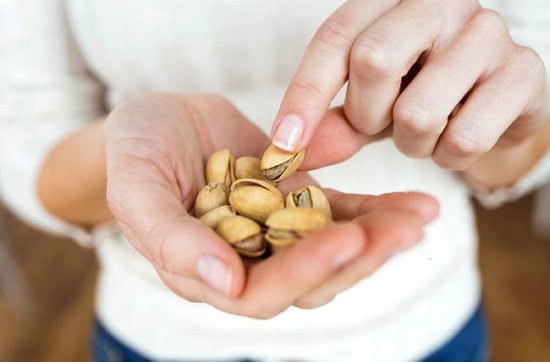Read these pistachio health benefits for the skin to learn why you must include them in your diet.
All About Pistachios
The pistachio is a small tree that belongs to the cashew family and traces its origins to Central Asia and the Middle East. The oblong seeds within the pistachio fruit are green and purple and are encased in a hard, cream-colored shell. These seeds have been consumed by humans since
7000 BC and are now classified as tree nuts.
Pistachios are made up of proteins, carbohydrates, healthy fats, fiber, antioxidants, and beneficial plant compounds. The nuts are tasty and have a distinct nutty flavor, and add color and flavor to foods.
Nutritional Components
100gms of pistachios provides:
- 569 calories
- 21 gm protein
- 28 gm Carbohydrates
- 46 gm fat and
- 10.3gm dietary fiber and minerals like copper, phosphorous, magnesium, iron, potassium, zinc, sodium, selenium, and calcium.
- They also contain vitamins B6, K, E, riboflavin, choline, niacin, folate, and thiamine.
Health Benefits of Pistachios
Including Pistachios in your daily diet is found to provide several health benefits. It helps lower LDL (bad) cholesterol levels and increases HDL (good) cholesterol levels. It increases the dilation of blood vessels, thereby lowering high blood pressure and improving cardiovascular health. Pistachios can decrease blood sugar levels and hence make a healthy food choice for people with diabetes.
Pistachios keep you feeling full longer, and snacking on them can reduce hunger and aid in weight loss. The high content of vitamin B6 in pistachios helps in blood sugar regulation. It is vital to form hemoglobin that functions as an oxygen carrier in your red blood cells. Good oxygen supply to your cells ensures optimum functioning of your brain and nervous system. It also helps your body fight infections by boosting your immune system.
Antioxidants in pistachio protect your cells from damage due to free radicals and protect against chronic diseases like cancer.
They also have beneficial antioxidants like lutein which boost eye health. Pistachios have a high protein and amino acid content essential for tissue growth, immune function, energy production, and nutrient absorption in your body.
Potassium and fatty acids in pistachios have anti-inflammatory properties and help to stave off the development of chronic diseases in your body. Dietary fiber in these nuts act as prebiotics in your digestive system, thereby promoting gut health.
Pistachio Health Benefits for The Skin
Pistachios are rich in vitamin E, which is very beneficial for skin and hair health. It reduces inflammation and treats wounds and scars. The fatty acids in pistachio moisturize and nourish skin keeping it supple and elastic.
They protect your skin from sun damage, treat dark spots, prevent
wrinkle formation, treat skin dryness, and impart a healthy glow to your skin. Pistachios are used in both aromatherapy and massage therapy to treat skin dryness. They keep your skin looking young by delaying the signs of aging. They protect your skin from blemishes and reduce the occurrence of acne.
Pistachios contain biotin, which prevents hair loss. It also treats dry hair and split ends while the fatty acids promote hair growth make your hair stronger. The topical application of pistachio oil works effectively to keep your skin glowing, smooth, young, and healthy.
How to Consume and How Much to Drink
You can eat them raw by just deshelling them. Alternatively, you can roast them and eat them as a snack or use them in baking, salads, soups, sauces, ice creams, desserts, and add them as a flavoring agent in beverages and dishes.
Doctors recommend a daily serving of pistachios of not more than 1.5 to 3 ounces. The quantity may be recommended while considering the age and health condition of the person. Pregnant women can also eat pistachios because of their healthy vitamin and mineral content. Still, if there is any history of allergies, it is better to do so with medical consultation.
Precautions and Side Effects
- Roasted and salted pistachios might increase the risk of heart attack and strokes because of their high sodium content. Watch out for this risk and opt for raw pistachios.
- Some people may not well tolerate the type of carbohydrate in pistachios.
- It can cause bloating, nausea, constipation, indigestion, and abdominal pain.
- Excess consumption can also overheat your body.




